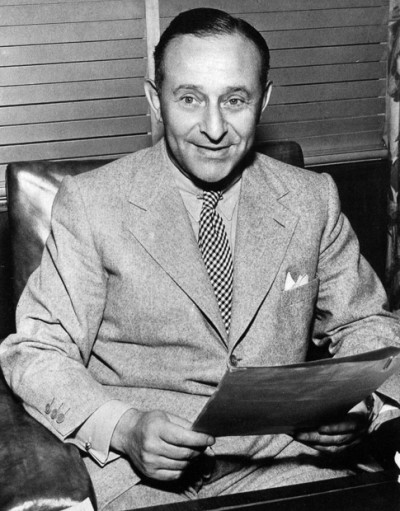Arthur Freed (Arthur Freed)

Arthur Freed was born to a Jewish family in Charleston, South Carolina, and began his career as a song-plugger and pianist in Chicago. After meeting Minnie Marx, he sang as part of the act of her sons, the Marx Brothers, on the vaudeville circuit, and also wrote material for the brothers. He soon began to write songs, and was eventually hired by Metro-Goldwyn-Mayer. For years, he wrote lyrics for numerous films, many set to music by Nacio Herb Brown. In 1939, after working (uncredited) in the role of associate producer on The Wizard of Oz, he was promoted to being the head of his own unit within MGM, and helped elevate the studio to the leading creator of film musicals. His first solo credit as producer was the film version of Rodgers and Hart’s smash Broadway musical Babes in Arms (also 1939), released only a few months after The Wizard of Oz. It starred Mickey Rooney and Judy Garland, and it was so successful that it ushered in a long series of “let’s put on a show” “backyard” musicals, all starring Rooney and Garland. One child star, Shirley Temple, wrote in her autobiography that when aged twelve she was interviewed by Freed with a view to transferring her career to MGM. During the interview he unzipped his trousers and exposed himself to her. “Being innocent of male anatomy, she responded by giggling, and he threw her out of his office”, said the actress’s obituary. Freed brought an outstanding amount of talent from the Broadway theaters to the MGM soundstages including Vincente Minnelli, Betty Comden, Adolph Green, Roger Edens, Kay Thompson, Zero Mostel, June Allyson, Nancy Walker, Charles Walters, orchestrators Conrad Salinger, Johnny Green, Lennie Hayton, and many others. He also helped shape the careers of stars including Gene Kelly, Frank Sinatra, Red Skelton, Lena Horne, Jane Powell, Esther Williams, Kathryn Grayson, Howard Keel, Cyd Charisse, Ann Miller, Vera-Ellen, and many others. He brought Fred Astaire to MGM after Astaire’s tenure at RKO and coaxed him out of semi-retirement to star with Garland in Easter Parade. His team of writers, directors, composers and stars produced a steady stream of popular, critically acclaimed musicals until the late 1950s. He allowed his directors and choreographers free rein, something unheard of in those days of committee-produced film musicals, and is credited for furthering the boundaries of film musicals by allowing such moments in films as the fifteen-minute ballet at the end of An American in Paris (1951), after which the film concludes moments later with no further dialogue or singing, and he allowed the musical team of Lerner and Loewe complete control in their writing of Gigi (1958).
According to Hugh Fordin’s book The World of Entertainment, however, Freed did have a hand in the stage-to-screen adaptation of at least one of MGM’s musicals, the 1951 Technicolor remake of Kern and Hammerstein’s stage classic, Show Boat. It was Freed who disagreed with the original structure of the show’s second act, in which more than twenty years pass between most of the act and the final three scenes of the musical. He felt that it made for a lack of drama in the story, and so, together with screenwriter John Lee Mahin, Freed hit upon the idea of having the gambler Gaylord Ravenal leave his wife Magnolia while both are still young and Magnolia is expecting a baby, and then having Julie, the half-black actress who is forced to leave the boat because of her mixed race background, be the person who brings Ravenal and Magnolia back together again after a separation of only a few years rather than twenty. And it was Freed who cast Ava Gardner in the role of Julie. Two of his films won the Academy Award for Best Picture: An American in Paris and Gigi. On the night that An American in Paris won Best Picture, Freed received an Honorary Oscar, and his version of Show Boat was also up for two Oscars that year, though it lost both to An American in Paris. But what is now his most highly regarded film, Singin’ in the Rain (1952), won no Oscars whatsoever, nor was it nominated for more (e.g. Best Picture, Best Director, etc.). He was inducted into the Songwriters Hall of Fame in 1972. Freed left MGM in 1970 after failing for almost a decade to bring his dream project, a biographical film of Irving Berlin, Say It With Music, to the screen. He died three years later surrounded by his family.
Born
- September, 09, 1894
- USA
- Charleston, South Carolina
Died
- April, 12, 1973
- USA
- Los Angeles, California
Cause of Death
- heart attack
Cemetery
- Hillside Memorial Park
- Culver City, California
- USA



